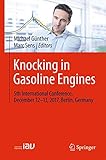Knocking in Gasoline Engines [electronic resource] : 5th International Conference, December 12-13, 2017, Berlin, Germany / edited by Michael Günther, Marc Sens.
Contributor(s): Günther, Michael [editor.] | Sens, Marc [editor.]
| Sens, Marc [editor.] | SpringerLink (Online service)
| SpringerLink (Online service) .
.
Material type:  BookPublisher: Cham : Springer International Publishing : Imprint: Springer, 2018Edition: 1st ed. 2018.Description: IX, 384 p. 308 illus. online resource.Content type: text Media type: computer Carrier type: online resourceISBN: 9783319697604.Subject(s): Automotive engineering
BookPublisher: Cham : Springer International Publishing : Imprint: Springer, 2018Edition: 1st ed. 2018.Description: IX, 384 p. 308 illus. online resource.Content type: text Media type: computer Carrier type: online resourceISBN: 9783319697604.Subject(s): Automotive engineeringForeword -- Introduction -- Pre-Ignition -- Simulation -- Optical Measurement Technique -- Fuel/Lubricating Oil -- Knock Detection -- Water Injection -- Combustion Process.
The book includes the papers presented at the conference discussing approaches to prevent or reliably control knocking and other irregular combustion events. The majority of today’s highly efficient gasoline engines utilize downsizing. High mean pressures produce increased knocking, which frequently results in a reduction in the compression ratio at high specific powers. Beyond this, the phenomenon of pre-ignition has been linked to the rise in specific power in gasoline engines for many years. Charge-diluted concepts with high compression cause extreme knocking, potentially leading to catastrophic failure. The introduction of RDE legislation this year will further grow the requirements for combustion process development, as residual gas scavenging and enrichment to improve the knock limit will be legally restricted despite no relaxation of the need to reach the main center of heat release as early as possible. New solutions in thermodynamics and control engineering are urgently needed to further increase the efficiency of gasoline engines.


There are no comments for this item.